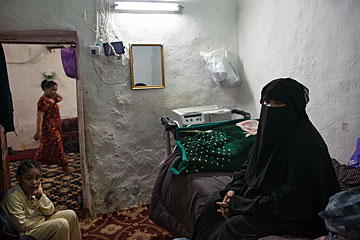
Fatima Hazazi's state-supplied dialysis machine is a lifesaver and a burden
Hen times are tight, the arrival of a utility bill can be enough to push some families over the edge. It is no different in the Hazazi home, a squalid, single-story apartment in one of the poorest areas of Riyadh, the capital of one of the richest countries in the world. "The children need so much, but just surviving is expensive too," says Fatima Hazazi, looking through her latest water and power statements. "My heart hurts when the bills come."
Her husband's minimum-wage job as a coffee server at a government ministry barely covers the family's rent. Paying the bills is a laborious exercise in priorities. Will the family eat meat this month, or will they have running water? Can she afford a plastic sheet to stop the winter rain from trickling into the bedroom, or should she get the refrigerator fixed? The only thing that is nonnegotiable is the electricity. Hazazi looks to the small white machine that hums at the foot of her bed, its plastic tubes attached to a catheter port embedded in her stomach. For seven hours every day, Hazazi must undergo home dialysis, a painful process that purifies her blood now that her diseased kidneys can't. "If I don't pay the electricity bill, the power goes out. When the power goes out, my machine stops. And if my machine stops ..." Hazazi doesn't need to finish her sentence. Even if she were strong enough for a kidney transplant, which doctors say she is not, the waiting list is many years long.
Saudi Arabia has one of the world's highest concentrations of superrich households (those worth more than $100 million), yet 1 in 5 Saudi citizens, or some 4 million people, live like Hazazi, subsisting on less than $1,013 a month for a family of eight — which puts them below Saudi Arabia's official poverty line. Extreme poverty, defined by the government as living on less than $453 a month, is experienced by 1.63% of the population, according a 2009 estimate by the office of the National Strategy to Combat Poverty, one of the government's more recent attempts to assess the poverty issue. The Saudi government has just launched a poverty-tracking survey, its first systematic assessment of income since 2003. Results will be made public within the next few months, but charity workers and activists suspect the actual number of Saudis living in poverty may be much higher than the earlier estimates of 20% and will keep rising thanks to chronic joblessness, high inflation, costly rent and a rapidly growing population.
The government argues that free health care, free education and subsidized fuel prices (bottled water, at 35 cents a liter, costs more than gasoline) mean that no one is truly poor in Saudi. But an inability to tackle the root causes of poverty demonstrates that the government is inadequately prepared for a future in which the country's population keeps growing and its oil wealth begins declining. In a region where unemployment, poverty and widening wealth gaps have sparked revolutions, the risks to the Saudi monarchy — one of the U.S.'s most important Middle Eastern allies and a key bulwark against Iranian expansion — are enormous.
Since oil was first commercially exploited in the 1930s, Saudi Arabia has been able to lavish the windfall on its populace — which served as proof that the monarchy's legitimacy was blessed by God. That narrative is now under threat. "Poverty is proof, if you needed one, that Saudi is not the Islamic utopia that it strives to be," says Thomas W. Lippman, author of Saudi Arabia on the Edge: The Uncertain Future of an American Ally. "No longer can its leaders pretend that theirs is a perfect society that embodies the will of God. They have got real problems."
In less than eight decades, Saudi Arabia has gone from impoverished desert backwater to an oil-producing powerhouse worth $740 billion in GDP, but its population has grown at a similarly precipitous rate, from 6 million in 1970 to 27 million today, largely a result of high birth rates and an influx of foreign workers, who make up a quarter of the population. Employment schemes and benefit programs have failed to keep up. More than two-thirds of Saudis are younger than 30, a demographic fact all the more alarming given that nearly three-quarters of unemployed Saudis are in their early 20s, out of an official unemployment rate of 12%. And while the oil reserves are likely to last well into the middle of the century, domestic consumption is on the rise. If current trends continue, Saudis may end up consuming more oil than they export, undermining an economy dangerously dependent on a single resource, and one that offers little in the way of well-paying jobs. "Ninety-two percent of our budget comes from oil," notes Prince Alwaleed bin Talal, Saudi Arabia's richest man and head of Kingdom Holding, an international investment company based in Riyadh. "This is dangerous. This is what we call an economic time bomb."
